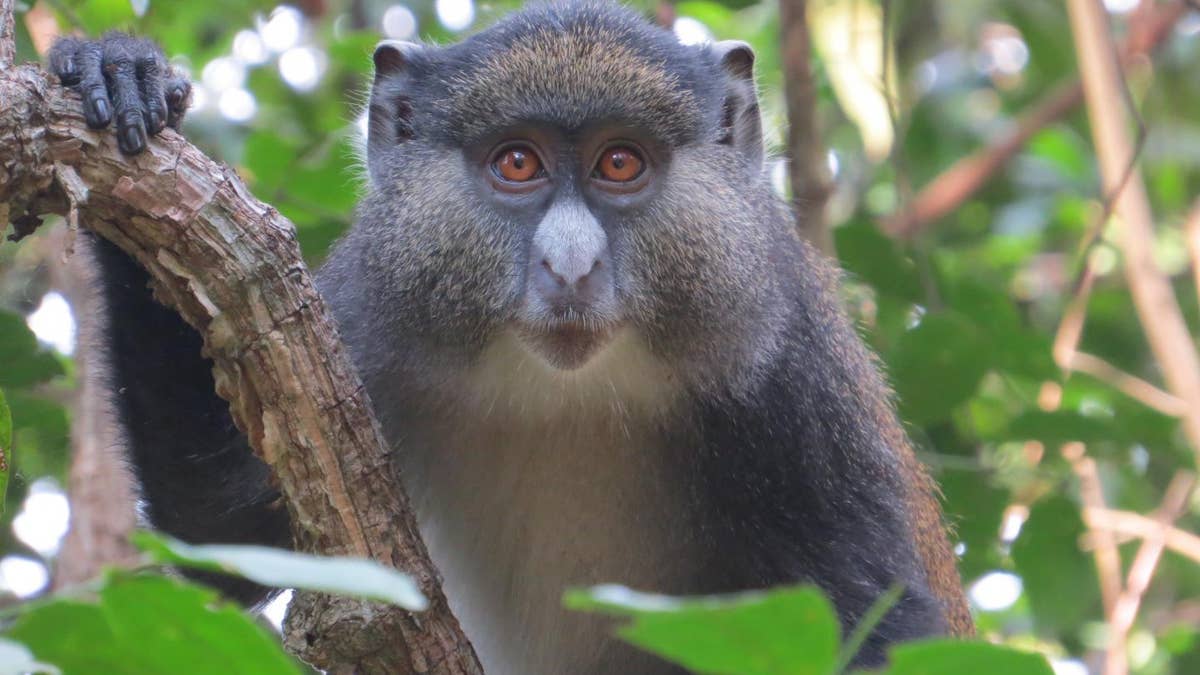
"Jimmy" is a hybrid male monkey in Dr. Kate Detwiler's study group in Gombe National Park. (Credit: Maneno Mpongo / Gombe Hybrid Monkey Project)
Sex-mad monkeys have been sexually experimenting with other species, creating an entirely new hybrid population of apes — and scientists are absolutely fine with it.
The primates from Tanzania's Gombe National Park have been at it for hundreds or even thousands of years, according to a new study.
By peeping into the DNA from the feces of 144 guenon monkeys from the site, researchers found evidence of ongoing mating between two genetically distinct groups.
These apes are known for their striking features long thought to be signs of species-specific mating — some have bushy beards, others have brightly-colored tufts of hair, and even more have big noses.
But the new study suggests they may not be that choosy after all.
Red-tailed monkeys and blue monkeys are thought to be the only species of guenons living in the narrow forests along Lake Tanganyika in Gombe National Park.
And within the site there is an entire hybrid zone whose inhabitants include the offspring of red tails and blues.
They've been living in plain sight of researchers for a long time, according to the new findings.
Roughly 15 percent of the park's population is made up of these hybrids, which can be distinguished by their combined markings from both parental species.
"There's a lot of promiscuity taking place in Gombe National Park. Red-tails are mating with blues, blues are mating with red-tails, blues are mating with blues, red-tails are mating with red-tails, and hybrids are mating with everyone," said Dr Kate Detwiler, who led the new research.
"But we're just not seeing any negative consequences from these two very different species repeatedly mating and producing offspring on an ongoing basis. If the differences in their facial features are so important and signal that they shouldn't be mating, then why is this happening and why do I keep finding hybrid infants?"
It wasn't until scientists examined their poop that they discovered the apes staring back at them from their tree-top habitats included an altogether new breed.
Detwiler collected 230 feces samples from the guenons, storing them in a special freezer.
She matched each poop with the monkey she believed it belonged to with photos, videos and notes.
She then extracted the DNA from the sample, and went even further by extracting the mitochondrial DNA (these are the structures within cells that convert the energy from food into a form that cells can use).
This strand of DNA is inherited from the monkey's mother.
And the molecular research gave the scientist the clearest picture yet of the mother's species, as well as the species of the monkey whose poop she was studying.
The data indicates that the park, originally colonized by red tails, was at one stage invaded by blue apes on the hunt for mates.
And neither type of primate was put off by the other's distinct features, opening the floodgates to cross-species copulation — with future generations of hybrid monkeys following suit.
But guenons aren't the only amorous apes that have shrugged off sexual norms.
There's also the macaque, which have been spotted having sex with deer numerous times.
"The Gombe hybrid population is extremely valuable because it can be used as a model system to better understand what hybridization looks like and how genetic material moves between species," said Detwiler.
"We have this amazing laboratory in nature to help us answer many questions about hybridization and how species boundaries are maintained.
"This research is very timely because hybridization often occurs in response to environmental changes, as we are seeing with climate change and modified landscapes — it is nature’s way to respond."
This story originally appeared in The Sun.
